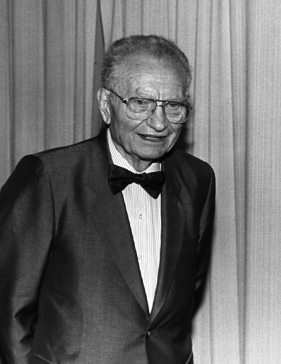Paul Samuelson, 1915-2009

(Wikipedia)
... let me give you a bit of boring autobiography. I came to the University of Chicago on the morning of January 2, 1932. I wasn't yet a graduate of high school for another few months. And that was about the low point of the Herbert Hoover/Andrew Mellon phase after October of 1929. That's quite a number of years to have inaction. And I couldn't reconcile what I was being taught at the University of Chicago — the lectures and the books I was being assigned — with what I knew to be true out in the streets.
My family was well off but not rich. I spent the four years I was an undergraduate working on the beach. And it wasn't because I was lazy; it was because my freshman class would go to a hundred different employers and wouldn't get a nibble. That was a disequilibrium system. I realized that the ordinary old-fashioned Euclidean geometry didn't apply.
And I applauded when the major members of the Chicago faculty — maybe even a few years before Keynes's general theory [published in 1936] — came out with a petition to have deficit-financed spending without taxation in order to create a new increment of spending power. And I was for that. And Franklin Roosevelt, who was not a trained economist, and who experimented and made a lot of mistakes, in his first days, by good luck or good advice got the system moving. It was in a sense an easier problem because the pathology was so terrible.
He would go to Warm Springs, Georgia. And that county — a pretty sizeable one, this is the old south — there were maybe three to ten people with enough income to file an income tax return. So, when along came the WPA, the PWA, and a little later the Reconstruction Finance Corporation, you could be very sure that those monies spit out by government — not from airplanes in the air, sending newly printed greenbacks, but essentially the equivalent of that — would be spent.
I don't know if you know the name, the professor E. Cary Brown wrote kind of the definitive article in the American Economic Review on what had been accomplished by deficit spending that was sustained. And his numerical findings were that there were no miracles — it was about what you'd expect — but it worked. And so I developed a guarded admiration for Keynes. And I say guarded because I don't think he understood his system as well as some of the people around him did.
Anyway, this swept the field for a number of decades. And then, when the 1970s came, with very heavy supply side shocks — the quadrupling of OPEC oil prices overnight, a rash of bad harvests, and the terrible price/wage control system contrived by Arthur Burns and Nixon 17 months before the election in order to ensure that they won. All these things added up. And Keynesianism, if it was thought to promise perpetual prosperity, became disparaged.
[Excerpted, with a few copy-editing changes, from a June 16, 2009 interview with Paul Samuelson conducted by Conor Clarke and published at theatlantic.com]
The New York Times obituary is here.
Labels: Notables
<< Home